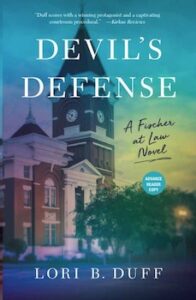Lori B. Duff is a lawyer, judge, and award-winning writer. Wherever she goes, she gets suckered onto the board. She’s a past president of the Georgia Council for Municipal Court Judges [CMuCJ] and the National Society of Newspaper Columnists [NSNC]. A two-time winner of the Georgia Bar Journal’s annual fiction competition, she has also won the Foreword Indies Gold Medal for Humor, the NSNC’s annual column contest, and the CMuCJ’s President’s Award as well as the Glen Ashman Educational Achievement Award. Her novella, Broken Things, won the Georgia Independent Author of the Year Award for Literary Fiction. When she’s not busy overseeing things and winning awards, she’s either at home in her empty nest with her husband, Mike, and rescue dog, Lincoln, or working on a new writing project. Meet Lori:
You are an author, but is it your day job? If not, what fills your days? I am a lawyer, though unlike my protagonist, Jessica Fischer, I’m at the end of my career and not the beginning. Thirty-some-odd years is enough to have done any one thing. I’m grateful, though, for the experience. Being a trial lawyer is a creative endeavor. After all, what is spin but story-telling? What is a trial but a big dramatic production that you must orchestrate? Spending so many years holding the hands of people going through their most difficult moments has given me a lot of insight into the human condition.
Did you always want to be an author? Oh, absolutely. When I was a little girl I wrote stories all the time, and even illustrated them myself, though I’m at best a passable artist. I still have some of them, and they are too humiliating to share. But then, the first draft is supposed to be terrible. You have to start somewhere, right?
What is your most recent book and what inspired you to write it? My most recent book is Devil’s Defense, which is the first in the Fischer-at-Law series. In it, Jessica Fischer, a young lawyer, represents Coach Frank “Tripp” Wishingham, III, with whom she disagrees on almost every point. I was inspired to write it when I was watching the confirmation hearings of a politician who shall-not-be-named. He was acting like a pompous ass, and I just knew that the people who had prepped him for the hearing were getting madder and madder that he hadn’t listened to their advice. I started thinking about how many times I’d prepped a client for trial and they thought they knew better than I did about what to say and not say on the stand and how frustrating it was. Then I started thinking about how books you read about lawyers never show that part. As Toni Morrison said, “If you find a book you want to read but it hasn’t been written yet, then you must write it.” So I wrote it.
represents Coach Frank “Tripp” Wishingham, III, with whom she disagrees on almost every point. I was inspired to write it when I was watching the confirmation hearings of a politician who shall-not-be-named. He was acting like a pompous ass, and I just knew that the people who had prepped him for the hearing were getting madder and madder that he hadn’t listened to their advice. I started thinking about how many times I’d prepped a client for trial and they thought they knew better than I did about what to say and not say on the stand and how frustrating it was. Then I started thinking about how books you read about lawyers never show that part. As Toni Morrison said, “If you find a book you want to read but it hasn’t been written yet, then you must write it.” So I wrote it.
What are you most excited about with this book? There are so many lawyer books and movies and tv shows out there, and so few of them have any relation to what it’s really like to be a lawyer. I think “Devil’s Defense” does a good job of showing what goes on behind the scenes and the ethical quandaries we face. Along the way, I fell in love with my characters and to me they’re real people who talk to me. I can’t wait to share them with the world!
How do you structure your day and make time for writing? The first productive half-hour of every day – including Saturdays and Sundays – is for working on my current writing project. It’s hard to find a day in which you can’t carve out just a half hour. I set a timer and everything, and when it goes off, I’m free to do whatever else needs to be done. Which might or might not be more writing, but it keeps the habit alive and going.
How do you handle setbacks and criticism? Setbacks stink. I like to remind myself of how many people tried and failed before they succeeded. I love hearing stories about people like Bonnie Garman, who didn’t publish Lessons in Chemistry until she was 60. Success only looks instant from the outside. As for criticism, so long as it is legitimate constructive criticism and not just meanness, I’m all here for it. It’s wonderful to hear “Oh, I loved it, it was so good.” That feeds the ego and is necessary from time to time if you want to keep going. But it doesn’t help you get any better. “I loved it, it was so good, but I’d like to hear more about X; or you use the word ‘just’ every third sentence*; or would she react like that? seems like she’s too timid to confront him” is so much more helpful.
*The word ‘just’ is just one of many words that will lead to my inevitable downfall.
Connect with Lori and learn more about her book via her website.


No comments yet.